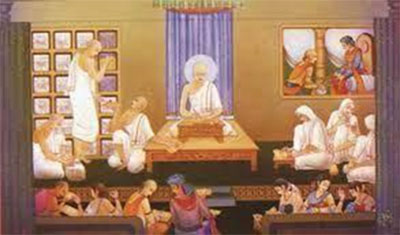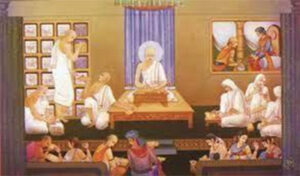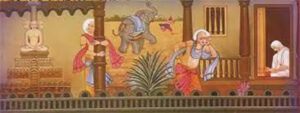One day while Haribhadrasūri was walking through the village, he accidently came across a royal elephant that had gone completely out of control. His keeper tried his best to control it but all his efforts were in vain. The elephant was running directly towards Haribhadrasūri and he was in grave danger of being trampled. In such a critical situation Haribhadrasūri had to find shelter. Frantically when he was looking around for a safe place, he saw a Jain temple. Without giving a second thought Haribhadrasūri rushed towards it and entered it to avoid being crushed by the mad elephant. He paused inside to regain his breath and looked around the temple in great disrespect. Being a Brahmin, Haribhadrasūri had a very scant regard for Jainism. Brahmins were usually staunch Shaivaites and looked down upon the Jain tradition. True to the tradition Haribhadrasūri did not care to know Jainism. He was also ignorant of what Jainism had to offer in the way of its philosophy. There was a proverb among staunch Shaivaites that one should not enter a Jain temple even if one happens to be crushed by an elephant. It means it is better to die crushed by an elephant than to enter a Jain temple. Therefore, Haribhadrasūri had never entered a Jain temple. Today he had to enter it to save himself from the wrath of the elephant. He saw a white marble idol of a tīrthaṅkara facing him in the temple. Sectarian disrespect drew his attention to the stomach of the idol instead of the graceful compassion flowing eyes. The stomach of the idol did not represent the emaciated body of an austere saint. It leads him to conclude that the Jain tīrthaṅkaras would have enjoyed substantial food.
He therefore made the following remark:
“vapureva tavācaṣṭespaṣṭaṃ miṣṭānna bhojanam|
nahi koṭara saṃsthe’gnau tarurbhavati śāṅvalaḥ||1||”
It means:
“Your stomach clearly indicates that you must be eating sweet food; because a tree (body) cannot remain green (healthy) when there is a fire (hunger) in the stomach.”
What he could not grasp then, he was to understand soon by an irony of fate.
Once the learned paṇḍita Haribhadra was moving out sitting in a palanquin, he passed by Jain nun’s” upāśraya (i.e. a place where Jain nun’s stay). He heard a verse recited in a very sweet voice by a Jain nun. The verse[11] contained the order in which the cakravartins (sovereign emperors) and vāsudevas were born in current avasarpiṇīas per Jain tradition. The paṇḍita Haribhadra obviously had no knowledge of Jain tradition regarding the birth of sixty three great personages (Triṣaṣṭiśalākāpuruṣas) in every utsarpiṇī as well as every avasarpiṇī. Therefore Haribhadrasūri failed to understand the meaning of what the Jain nun was reciting. Even Though he was the most knowledgeable scholar on the earth of that era, he realized his knowledge was incomplete. His open declaration of becoming a pupil of anybody whose tenets he could not understand made him pause on hearing the verse in the Jain nun’s voice. He desired to ask the Jain nun about the meaning of that verse. True to his decision, however, he brushed aside his hesitation and went inside.
On entering that Jain nun’s”upāśraya Haribhadrasūri asked the Jain nun as follows:
“ambāḍe! prabhūtamatra cākacikyaṃ vihitavatī bhavatī” |
The Jain nun replied:
“putraka! navaliptaṃ satyaṃ cakcakāyate” |
Then after, “who are you, my son!”, inquired the Jain nun namely Yākini.
“I am a priest of the king Jitāri. I have vowed that I should become the pupil of him or her whose sayings I do not understand. I do not fully understand the gāthā that you just recited. To fulfill my vow, kindly accept me as your disciple.”
Such a request of a royal priest surprised the Jain nun greatly. She was wise, and spiritually mature. Though she was a chief nun (mahattarā) of a large group of junior nun’s, she responded the paṇḍita very affectionately by saying that: “I can accept you as my son but I cannot make you my disciple.” She also said that nun’s do not teach males and are not supposed to have males as pupils. She therefore advised Haribhadrasūri to go to Ācārya Jinabhaṭ an authorized person to explain the meaning of the verse.
When Haribhadrasūri went to Ācārya Jinabhaṭa, the latter explained the verse in detail. Haribhadrasūri requested him to explain the characteristics of religion (dharma) and the fruit derived by leading a religious life.
Ācārya Jinabhaṭa answered his curiosity by saying:
“bhavaviraha (to get rid of transmigration) is the fruit attained by those who lead religious life without desiring anything.”
On hearing this Haribhadrasūri said:
“I would like to attain this bhavaviraha”
Ācārya Jinabhaṭa replied:
“If it is so, you shall have to embrace the Jain order which preaches complete cessation of sinful activities.”
On hearing this Haribhadrasūri requested Ācārya Jinabhaṭa to accept him as his pupil. Ācārya Jinabhaṭa asked him to go and get the consent of his family and relatives. Haribhadrasūri had to face heavy odds when he went to seek permission from his family and other close relatives. He continued to persuade them patiently.He explained to them that his knowledge of the world remained incomplete without gaining the knowledge of Jainism in detail. For that purpose as well as for adhering to his decision, it was incumbent upon him to be a Jain monk. He ultimately succeeded in gaining the consent of all his family members. Thereafter he returned to Ācārya Jinabhaṭa and was initiated into Jain monkhood. This is how he became pupil of Ācārya Jinabhaṭa.
Haribhadrasūri’s life is an outstanding illustration of a rapid growth in personality.
“The germ of rapid personality growth seems to lie in his keen desire to acquire new knowledge and his vow to accept him as his Guru, who taught him new things. There is a ring of honest search of discovery of new knowledge in his seeming proud vow and it provides the primal force for rapid and integral personality growth.”[16]
See the change, see the contrast. Once upon a time the paṇḍita Haribhadra used to say, “I would prefer to be crushed under the leg of an elephant, but would never go to a Jain temple.” The same Haribhadrasūri was forced by a mad elephant to enter a Jain temple to take shelter. At that time he made fun of the idol of a tīrthaṅkara. In course of time a great shift took place in his life from paṇḍita Haribhadra to Ācārya Haribhadrasūri. It opened new dimensions of knowledge and self realization in his life. He was convinced of the greatness of Jainism and digested its philosophy very well.
Acknowledgement:
https://www.wisdomlib.org/jainism/essay/yogadrstisamuccaya-of-haribhadra-suri/d/doc628040.html
From Book –
Yogadrst Samuccaya of Haribhadra Suri (Study), Chapter – 2, by Riddhi J. Shah



